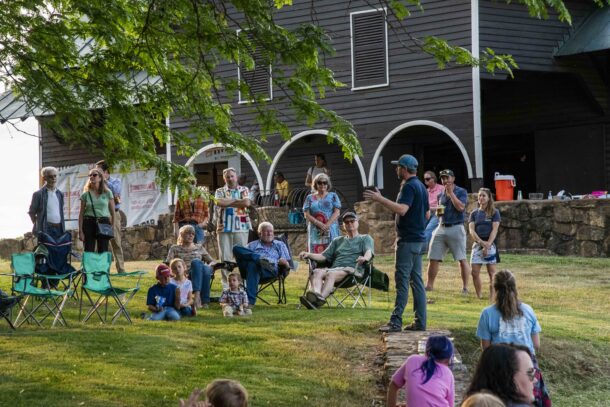Join us as a strong voice for the Rappahannock River at the state level.
The 2021 General Assembly session starts January 13th. We are prioritizing these issues and will regularly update this page.
We will include info on bill progress and how you can make a difference for the river. Your voices are vital!
To find who your representatives are, go to Who is My Legislator?
Environmental Literacy
River Issue: Despite the efforts of many individuals and organizations across the Commonwealth, environmental literacy remains a challenge for much of the state, especially those from traditionally disadvantaged communities. The closure of the Virginia Office of Environmental Education in October 2016 removed coordinated leadership by which to promote environmental literacy and focus on equitable access for all Virginia students in quality environmental education. The state agencies are now faced with vacancies in key roles which, without immediate action, puts progress toward the goal of an environmentally literate Commonwealth in even further jeopardy.
Environmental education leadership at the state-level would ensure better coordination between school districts, nongovernmental organizations, and state agencies, promoting a more holistic and comprehensive plan for improving environmental literacy throughout the Commonwealth. State leaders should partner with organizations that have experience with promoting and providing environmental education and are intentional about bringing these educational opportunities to low income communities and communities of color.
Budget and Policy Recommendations
- Support for budget amendments 374 #2s and 374 #2h . These amendments provide $350,000 the first year and $350,000 the second year from the general to support two positions in the Office of Environmental Education to provide increased opportunities for education programs on environmental issues across the Commonwealth.
- Support for $250,000 in funds from the Governor’s proposed budget for competitive grants to provide Chesapeake Bay meaningful watershed educational experiences (MWEE)
- Support for HB636 which requires the Department of Education, in consultation with the Department of Conservation and Recreation, the Science Museum of Virginia, and other stakeholders, to establish and update at least once every five years a Virginia student environmental literacy plan.
- Contact your local representatives to let them know you support Budget Amendments 374 #2s and 374 #2h and House Bill HB636
Resilient Communities and Ecosystems
River Issues: Virginians are on the frontlines of climate change. Coastal Virginia faces the highest rate of relative sea-level rise on the East Coast. Rainfall intensity is also increasing, threatening coastal, inland, and riverine communities. This places Virginia’s residents at risk and threatens the future of our coastal wetlands and shorelines. Sea level rise and increasing water temperatures threaten to set back decades-long investment in Virginia’s Chesapeake Bay and vital coastal ecosystems including the commitment to “no net loss” of wetlands. The chronically underserved and under-resourced communities least able to adapt, plan, and invest in preparedness and protection face the greatest risks from climate change while simultaneously facing compound threats of discrimination.
Budget and Policy Recommendations:
- Support for $5,750,000 in funding from the Governor’s proposed budget that continues to provide improvement funds for well and septic systems for homeowners at or below 200 percent of the federal poverty guidelines.
- Support for $100,000 in funding from the Governor’s proposed budget for septic hot spot analysis being done by VDH and VIMS.
- Support for $2,050,000 in funding from the Governor’s budget to establish, operate, and develop necessary databases for a Chesapeake Bay Septic Pilot program. The pilot program, through local health departments, shall provide oversight of the septic tank pump out and inspection programs in the Eastern Shore, Middle Peninsula, and Northern Neck regions of Virginia.
- Support for SB508 which shifts oversight of the Community Flood Preparedness Fund from DCR to the Soil and Water Conservation Board
- Support for HB769 which requires the Department of Health, effective July 1, 2023, to manage and enforce onsite sewage system pump-out compliance for Accomack, Essex, Gloucester, King and Queen, King William, Lancaster, Mathews, Middlesex, Northampton, Northumberland, Richmond, and Westmoreland Counties and the incorporated towns within those counties.
- Oppose HB1301/SB532 These bills would suspend the Commonwealth’s participation in the Regional Greenhouse Gas Initiative (RGGI) market-based trading program. 45% of the proceeds from RGGI go to the Community Flood Preparedness Fund (CFPF) to provide support for regions, localities, and tribes to reduce the impacts of flooding statewide and is currently solely funded by RGGI proceeds.In 2021, Virginia received $102.4 million for the CFPF. Several localities in the Rappahannock River watershed have already benefited from the CFPF and more will apply for funds in 2022. Until there is a viable alternative to fully fund the CFPF, we cannot support a withdrawal from RGGI.
- Oppose HB1322 which amends the definition of living shorelines to include low crested armoring, as defined in the bill.
Stormwater Runoff and Agricultural BMP Water Quality Programs
River Issue: Stormwater runoff from urban and suburban areas is the fastest growing source of pollution to our water and the main reason many of our urban streams are impaired. This growth is largely caused by the expansion of our built environment and the impervious surfaces — parking lots, roofs, and roads — that carry more polluted runoff to our waterways. With more intense rain- fall events on the horizon as a result of climate change, untreated stormwater may exacerbate dangerous and costly flooding. Virginia’s plan to clean up the Chesapeake Bay calls for strong investments in better stormwater control to protect clean water and frontline communities.
Budget & Policy Recommendations:
- Support for the $100 million in funds allocated in the Governor’s proposed budget to the Stormwater Local Assistance Fund (SLAF)
- Support for the $4 million in funds allocated to the Virginia Conservation Assistance Program (VCAP). This program provides cost-share assistance for smaller-scale residential and commercial projects to improve drainage and reduce erosion such as rain gardens, conservation landscaping, and permeable driveways.
- Support for $146,217,000 in funds for Virginia Agricultural Cost-Share (VACS) Program
- Support for $25,707,000 in funds for technical assistance by Soil and Water Conservation Districts to ensure adequate staff capacity and training.
Upgrading Wastewater Treatment in Virginia
River Issue: Enhanced efforts are needed to upgrade Virginia’s wastewater facilities and to address the public health risk of combined sewer overflows from aging wastewater infrastructure. Upgrades to wastewater facilities are a proven strategy for benefiting water quality and reducing large quantities of pollution. Virginia’s wastewater agencies have played a major role in reducing nutrient pollution to date, but they have been asked to accelerate this important work in the Phase III Watershed Implementation Plan (Phase III WIP) and through recent legislation requiring upgrades to wastewater treatment and to remaining combined sewer overflow (CSO) systems. Virginia needs to support these programs to continue protecting water quality and public health.
Budget and Policy Recommendations:
- Continued support for the $68,600,000 in funds from the Governor’s proposed budget for wastewater treatment projects. Including grants of $27 million to the City of Fredericksburg and $16 million to the King George County Service Authority for wastewater projects.
- Support for budget amendments 486 #7s/486 #8s which provides additional $3.0 million in funds for improvements to the Fredericksburg wastewater treatment facility and $40.4 million in funds to Stafford County for upgrades to the Little Falls Run Wastewater Treatment Facility.
- Support for SB355 and HB1067 which adds the Fredericksburg wastewater treatment facility to the list of priority projects for the Enhanced Nutrient Removal Certainty Program.
Urban Forestry & Canopy Project
River Issues: Virginia is losing vast tracts of forests as well as urban tree canopy to development, redevelopment, and disease. These losses reduce the state’s capacity to address climate change, improve community health, and improve air and water quality. Forests and urban trees, first and foremost, need additional protection to preserve what we have left. Increased funding for planting new trees and maintenance of existing trees is also necessary to achieve needed canopy goals.
Budget and Policy Recommendations:
- Support for $13,240,000 in funding in the Governor’s proposed budget for the Virginia Department of Forestry. This funding
- Provides grant funding for localities to support tree planting and maintenance as part of the Chesapeake Bay Watershed Implementation Plan.
- Support new staff positions to assist with outreach and project implementation, provide technical assistance and training to localities for improved success.
- Restores operations and funds equipment purchases at the New Kent nursery, which will produce hardwood seedlings to support the Watershed Implementation Plan III.
- Increases opportunities for the Virginia Trees for Clean Water program.
- Support for SB 537 which expands to all localities provisions that currently only allow certain localities to adopt an ordinance providing for the planting and replacement of trees during the development process. The bill adds more flexibility for implementation and management of tree canopy banks, tree canopy credits, and tree canopy requirements.
- Support for HB206 which requires, as a condition for a permit by rule for a small energy project, that the applicant conduct an analysis of the beneficial and adverse impacts of the proposed project on natural resources. The bill requires that if the Department of Environmental Quality determines that there will be a significant adverse impact on wildlife, historic resources, prime agricultural soils, or forest lands, the applicant must also submit a mitigation plan with a 90-day public comment period. The bill specifies that a disturbance of more than 10 acres of prime agricultural soils, as defined in the bill, or 50 acres of contiguous forest lands, as defined in relevant law, is deemed to be a significant adverse impact on natural resources.
Check out this Trees fact sheet to learn more about Urban Forestry and Canopy
We will regularly update this page to provide you information on bill progress and how you can make a difference for the river. Your voices are vital!

